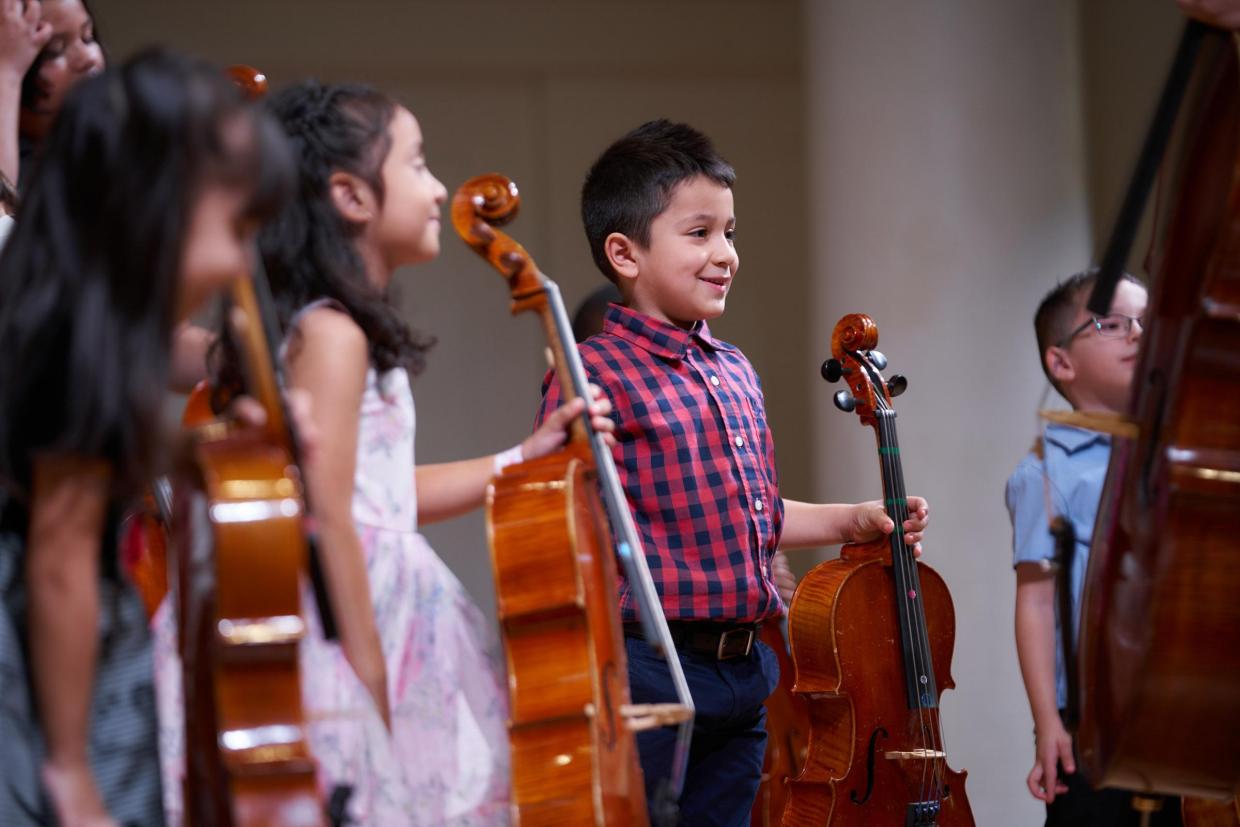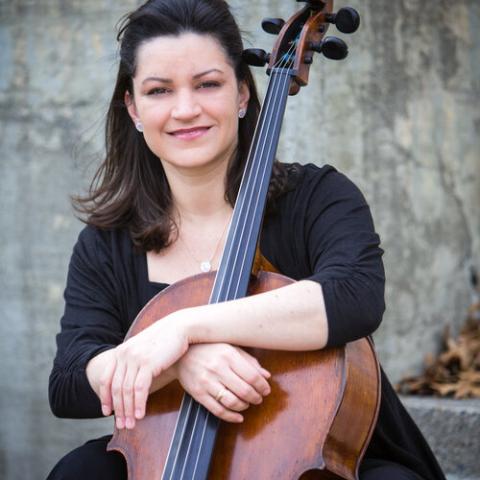Empowering Communities through Music Outreach
A discussion with Bianca d'Avila do Prado

November 21st, 2023
Lee este artículo en Español aqui.
Leia em português aqui.
In the heart of Evanston, the Music Institute of Chicago implemented an initiative to make first-class music education accessible to all. MIC's commitment to Evanston's community led to the creation of the Third Coast Suzuki Cello program in May 2022. Initially welcoming 15 students aged 4 to 11, the program prioritizes accessibility. Bilingual Suzuki-trained teachers conduct lessons, aiming to make the program inclusive for Spanish-speaking families. In this blog post, we delve into the Third Coast Suzuki program with coordinator Bianca d'Avila do Prado, exploring the program’s origins, impact, success stories, and the rewarding experiences of those involved.
About the Third Coast Suzuki Cello Program
The Third Coast Suzuki Cello program was developed from MIC's decision to dedicate more resources to Evanston, particularly its Latino community. Inspired by a critical need for music education, the Third Coast Suzuki program emerged through collaboration with community leaders.
Students enrolled in the Third Coast Suzuki Cello program receive tuition-free access to the extensive benefits of the Music Institute of Chicago Suzuki Program. This includes weekly 30-minute private lessons and 30-minute group classes. Additionally, students enjoy tickets to concerts at Nichols Concert Hall, active participation in MIC performances, and the chance to secure scholarships for events like the Chicago Suzuki Institute and the MIC Suzuki Winter Workshop. The program provides students with essential resources such as cellos, stools, straps, Suzuki books, and CDs. Moreover, parents are invited to attend orientation sessions focusing on the Suzuki philosophy and method.
Inspiration and Involvement
Bianca d'Avila do Prado, program coordinator of the Third Coast Suzuki Cello program, empathizes with the challenges of accessing music lessons. Beginning her own cello lessons at the age of 15, she endured a one-hour bus journey to reach her classes. Having experienced firsthand the hurdles of limited music accessibility, she found inspiration in contributing to a program that provides children with the chance to embark on their musical journey from a young age:
“I am originally from Brazil, and after finishing my graduate studies at Illinois State University, I had the opportunity to start a new Suzuki Cello program in Sandpoint, Idaho. It was an amazing experience to me and I’m so grateful for my time there. However, Illinois always felt like home to me and when I heard from Dr. Tanya Carey that MIC was looking for a Suzuki cello bilingual teacher, I immediately wrote to Dean Emily Abraham to learn more about the program. A few weeks after a Zoom interview, I moved back to Illinois to gladly welcome, along with my colleague Everardo Sanchez, the first group of students and families to our Third Coast Cello program. I started playing the cello when I was 15, and I had to travel 1-hour on a bus to get to cello lessons. Since the beginning of my Suzuki teacher training journey, I have had this strong desire to give children the opportunity I didn't have to start learning the cello at an early age. I realize being part of a Suzuki program in the US can be very expensive, so I was so thrilled to learn MIC was implementing this wonderful project, seeking to give students that couldn't otherwise afford to get high-quality music education the opportunity to enter the amazing world of Suzuki cello playing. I feel extremely honored to be part of this pioneering initiative and thanks to generous donors and supporters, this program is helping me to fulfill the desire I have had in my heart for so many years.”
Impactful Success Stories
Progress hinges on support, and our program has been fortunate to be backed by incredibly supportive and committed parents. While many families may not have been acquainted with the Suzuki method or had prior musical exposure, the unwavering support from both families and the program as a whole has cultivated confident and joyful musicians, even in the midst of the challenges of learning an instrument.
“Our first group of younger students lived their first years of life quarantining, so it was a real challenge for them to focus while attending in person activities, especially among other children. Some parents felt discouraged in the beginning and had a hard time believing their children would ever be able to learn something as intricate as playing the cello. I insisted that being part of our program would teach their children much more than cello: it would help them with discipline, focus and cooperation in a nurturing and loving environment. After a year, these kids just had an amazing performance at Nichols Concert Hall, and besides playing beautiful music with so much joy, showed wonderful stage presence, attention and discipline. They matured so much not just musically, but in all aspects of their lives. It is so rewarding witnessing the community that students and parents are building. You can see friendships among the students and how happy they are to see each other every week in group class. Our parents are very supportive to each other and have been doing a wonderful job inviting and welcoming new families to the program. A famous Suzuki quote says 'Every child can!', stating that every child can learn to play beautiful music, it is just a matter of adequate instruction, nurturing and music filled environment, daily listening and practice with cooperation of the families.”
“One of my students has a hearing impairment and absolutely loves playing her cello. She plays with all her heart and so much joy, it’s a true gift getting to watch her blooming as a cellist in lessons, group classes and performances! She is eager to learn new things and has been developing one of the most beautiful tones in our group. It’s been a wonderful learning experience for me, and with the help of her dedicated father, we have made huge improvements working together. This Fall I started teaching a student with mild cerebral palsy. She is very smart, but needs help developing strength on her right arm and hand. I told her mom there’s no better way to do it than playing the cello! They’ve been working really hard at home and I can already see her strength improving but more importantly, I can see a boost in her confidence and her ownership in trying new and challenging things and believing she can accomplish anything if she puts the effort into it. “
The Rewards of Teaching and Learning
The benefits of teaching and learning extend beyond the practice room. Bianca emphasizes the gratification derived from witnessing initially hesitant young students evolve into self-assured musicians and the joy in her personal growth, continually acquiring new teaching skills in the process:
“My main goal as a teacher is to help students learn to love playing the cello as much as I do. It is not an easy task learning the cello, but with patient, loving, age appropriate and structured instruction, every student can learn.
It is so rewarding to see some students and families that seemed shy and a little intimidated by this completely new world of music lessons showing so much confidence, joy and passion for learning just a few weeks after joining our program.
Seeing the community that is being formed among parents and little cellists is also very touching. It brightens my Saturdays up to see so many little cellists coming in and out of the building, proudly carrying their cellos and stools, smiling and feeling accomplished, with parents and siblings around. Every time I meet other faculty or staff members they tell me about how adorable these young cellists are. Making music and learning new skills with joy is something we want to bring to these families, and they can feel that! It is so contagious, that I feel everyone who sees them can't help but smile.”
“Teaching students with special needs has helped develop my teaching skills to a different level of compassion and excellence, finding new ways to help them facing their particular challenges in a light but effective manner. Each one of these children has been inspiring me to be a better person and a better teacher, week after week.
I’m also super grateful for the teaching development opportunities I’ve been having through MIC funding for Suzuki training, attending lectures and getting to work with some of the teachers who are a reference not just to me, but to the Suzuki world as a whole.”
"If children hear fine music from the day of their birth and learn to play it, they develop sensitivity, discipline and endurance. They get a beautiful heart."
“In my journey as a teacher and a musician, I have been able to see the way music can connect people, independent of their language, age or ethnicity. Music is a powerful tool to bring people together, to create better citizens, and to bring peace, joy and beauty to the world.Suzuki stated that: ‘If children hear fine music from the day of their birth and learn to play it, they develop sensitivity, discipline and endurance. They get a beautiful heart.’ I truly believe that the world would be a better place if all children have the opportunity to learn music. Living in an era where instant gratification has been so popular, and where people have the impression to be constantly ‘connected’ to each other, but never felt so frustrated and lonely, children can benefit so much from music education. It shows them that slow progress is still progress and that sometimes you will need to patiently and diligently work for a long time to achieve something meaningful. That builds endurance and strength of character. They also feel part of a community and learn a lot about taking turns, being compassionate with learning difficulties other children may have and by sharing the beauty and uniqueness of their playing with their families and the community.”
The Importance of Accessibility
“Making music education accessible can be much more than just offering tuition free programs. It also means offering a safe space for learning, where any person who wants to learn music has a place, independent of level, age, ethnicity or musical goals. Welcoming families from diverse cultures, ages and social backgrounds makes the Music Institute of Chicago a very rich environment. I love that I get to work in such a diverse and inclusive place, where I get to teach students with a variety of ages, goals and levels and work with world class artist teachers from many different cultures and backgrounds. “
We Can Make Music Accessible Together
MIC has a goal to expand Third Coast Suzuki Cello to serve fifty Evanston children and families. In addition, the community can recommend prospective students and attend performances at Nichols Concert Hall.
We are currently welcoming new students from 4 to 11 years old to join our program. For information in English email eabraham@musicinst.org and in Spanish email bdavilaprado@musicinst.org
Financial support is always needed to sustain and grow the program. If you would like to support us in our mission to make music accessible for everyone you can donate here.
Learn more about how MIC is impacting the community in our latest Impact Report.

